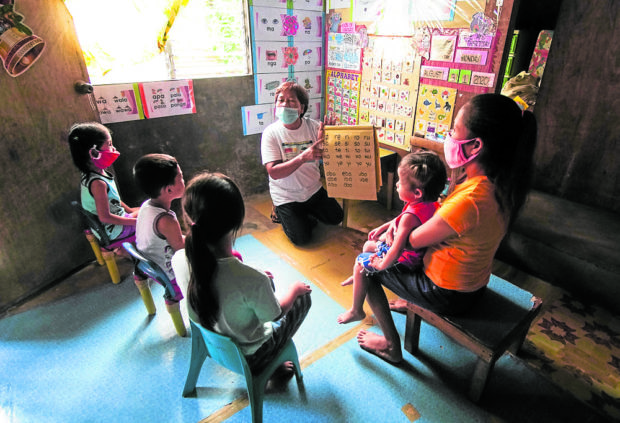
HOME SWEET HOME Parents in the village of Vinisitahan in Donsol town, Sorsogon province, turn their homes into classrooms, with the help of local public school teachers, and set up reading corners with simple educational materials. The Vinisitahan folk are an exception since most parents are unprepared to handle a home-based learning program. —MARK ALVIC ESPLANA
Having to homeschool five children overwhelms stay-at-home mother April Rose de Jesus, 34, whose daily routine before the pandemic was mainly to keep the household running.
The dilemma faced by De Jesus is similar to other parents who are not prepared to handle online learning for their children or even guide them through modules provided by their teachers.
In the City of Calapan in Oriental Mindoro province, teachers are challenged by the need to monitor not just the learners but also their parents or their representatives at home, while ensuring everybody’s safety from the new coronavirus disease (COVID-19).
City Schools Division Superintendent Laida Lagar-Mascarenas cited results of a recent survey her office conducted showing that more than 1,000 public school students had no one capable of teaching them at home.
The school division, she said, could only hire 245 teacher assistants to assist parents.
In the case of De Jesus, all she could do was to ready a single table, which was also the family’s dining area in their small apartment in the town of Bay, Laguna province, for her children—four of them enrolled in a public grade school whose classes were set to open on Monday.
Lifeline
“My eldest [in high school]should help his younger siblings [in their lessons]. I’m poor in Math and have long forgotten the school lessons,” said De Jesus, a college dropout.
Since her husband leaves every day for work at a relative’s construction project, De Jesus was left with the daunting task, much like every single parent when schools shifted to distance learning.
Her only lifeline, in case of a difficult Math problem, is a Facebook chat group with the adviser and other parents.
“That’s why, among ourselves (parents), we thought we should be the ones to get salaries and also the grades,” she said.
From 3.8 million last year, about 3.4 million basic education students enrolled in the provinces of Cavite, Laguna, Batangas, Rizal and Quezon (Calabarzon), according to the Department of Education’s (DepEd) regional director, Wilfredo Cabral.
Public schools, whose opening was twice postponed, would still accept late enrollees until November.
Physical, mental stresses
“So far, for Q1 (first quarter), we’re all good. The only [delays] we see was the distribution [of modules] to villages specially in the remote [areas],” Cabral said in a phone interview last week.
But the cancellation of physical classes was equally challenging to teachers, said Alliance of Concerned Teachers (ACT) regional union president Alvin Fuentes.
Long hours
According to ACT, at least two teachers had died to illnesses like hypertension exacerbated by the mental and physical stresses while preparing for the opening.
The DepEd in Calabarzon has recorded five deaths of teachers due to the coronavirus disease.
There were about 87,000 teachers in the region, each assigned five to six sections or a class of 45 students.
In the weeks leading to the school opening, teachers had spent long hours printing out, sorting and distributing learning materials, said Maricel Herrera, a high school teacher from Bacoor City, Cavite.
Aside from the modules, “we had to prepare learning activity sheets [on top of] calling and texting each student’s parents [for instructions],” she said.
“I never had to install internet at home until now,” said Fuentes, of Sta. Cruz, Laguna.
“Ask your internet provider and they might just tell you that most of the pending applications [for internet service] were by teachers,” she added.